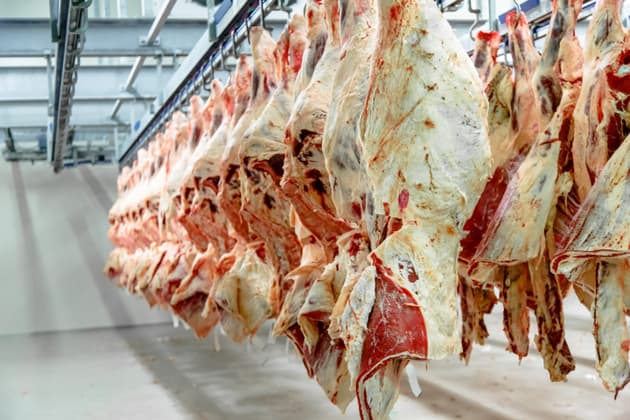
Revealed: Shocking safety record of UK meat plants
New figures show Britain’s meat processing plants and abattoirs have a shocking safety record. 18 workers lost fingers, parts of fingers or limbs and over 100 suffered serious injuries including damage to eyesight, and crush injuries to head or torso in just one year, between 2016-17.
The full data obtained by the “i” newspaper and the Bureau of Investigative Journalism covers six years, up till April 2017. There were two injuries a day on average in UK meat plants over that period, of which two a week were classified as serious. There is no sign that the numbers have reduced over that period.
More than 800 workers had serious injuries and 4,500 had to take more than three days off after accidents. Of that number, 327 workers came into contact with machinery, 393 were struck by objects and 125 suffered falls from height.
The Health and Safety Executive (HSE) told the Bureau that the food and drink manufacturing sector is twice as dangerous as the average for UK industries and the record of the meat processing industry is even worse.
“It is a concern for HSE, the level of injuries we see to employees in the meat processing sector,” said John Rowe, who is in charge of the manufacturing sector for HSE. He added: “They are at the top end of our concern level when it comes to injury and ill-health rates.”
Make change possible
Investigative journalism is vital for democracy. Help us to expose injustice and spark change
Click here to support usRowe is even more concerned about the long-term damage to workers, saying: “There’s a huge issue with manual handling in the meat processing sector”. He added: “In meat packing plants, that’s the most common cause of injury - upper limb disorders associated with just doing the same thing constantly throughout the shift. That’s where my main priority is.”
Conditions in many meat plants are tough and repetitive, with workers often placed on fast-moving factory lines, using various knives and other machinery to process, de-bone and prepare carcasses and meat cuts, or wrap, pack and carry products. Temperatures are often low and many workers are required to perform the same specific task for extended periods of time on shifts that can last up to 12 hours.
In abattoirs, workers can face additional injury risks from livestock being brought into the facilities - from being crushed or kicked by livestock, for example - and from transport lorries, fork-lift trucks or other vehicles, as well as slaughter equipment.
Accidents over those six years include a worker crushed and killed by a cow carcass - one of four who died in 2011 - and 78 amputations. Workers were often caught in inadequately guarded machinery and there were many lacerations from knives and other sharp tools.
 Carcasses in an abattoir; stock image via Shutterstock
Carcasses in an abattoir; stock image via Shutterstock
The UK meat processing sector is worth over £8bn. The industry employs around 75,000 people, according to the British Meat Processors Association.
“It's clear that the industry has got massive problems and needs to sort them out,” said Hugh Robertson, health and safety expert at the Trades Union Congress. “While there has been a lot of good guidance published by industry bodies, we know the practice on the ground is very, very different. It's leading to a large number of workers, many of them vulnerable, getting their health ruined as a result of their employer forcing unnecessary risk on them."
He added: “We know that a lot of abattoirs are dependent on migrant workers. Unions are concerned that they often have little knowledge of their rights and, even when they do know their rights, are unable to protect them because many of them are on temporary contracts or employed through an agency.” This can lead to workers not complaining about bad health and safety practices. A 2017 analysis of Office for National Statistics figures showed EU migrants make up 44.4% of the meat processing workforce.
Robertson claims that the difficulties faced by smaller operations can encourage managers and workers to pass up on health and safety precautions. “The profit margins in these abattoirs are often very small. They're closing all over the place, the small ones, and people are cutting corners and taking risks.”
He also said there are not currently enough health and safety inspectors going into abattoirs. This comment follows a recent call from the trade union, Unison, to send more meat hygiene inspectors into abattoirs.
Got a Story?
We welcome tip-offs from the public and we always protect our sources
Find out how to work with us“The investigation has unearthed extremely alarming and challenging data which the Health and Safety Executive must fully investigate and explain”, said Scottish National Party MP, Martin Docherty-Hughes, secretary of the All-Party Parliamentary Group on Occupational Health and Safety. He added: “We must ensure the full implementation of the law in relation to occupational health and safety; I am in no doubt that there will be cross party support for a full and thorough investigation.”
Nick Allen, chief executive of the British Meat Processors Association, said: “It is widely acknowledged that the challenges to health and safety in meat processing plants are greater than in other sectors.”
He explained there is an industry wide group comprising processing companies, HSE, the Food Standards Agency and unions, which is working to improve the situation.
“There is a concerted effort among individual businesses to improve health and safety and a number of plants can demonstrate that through better protective clothing, training and greater awareness they have managed to reduce the number of incidents. The industry is committed to improving and will continue to treat health and safety as a high priority.”
Stock header image, of supermarket meat, via Shutterstock





